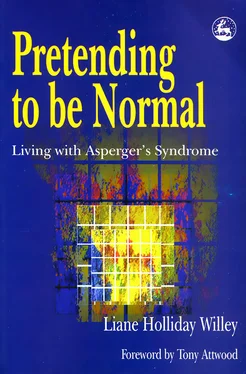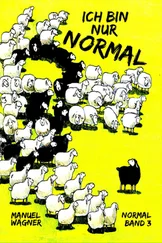Liane Holliday Willey - Pretending to be Normal
Здесь есть возможность читать онлайн «Liane Holliday Willey - Pretending to be Normal» весь текст электронной книги совершенно бесплатно (целиком полную версию без сокращений). В некоторых случаях можно слушать аудио, скачать через торрент в формате fb2 и присутствует краткое содержание. Город: London, Год выпуска: 2000, ISBN: 2000, Издательство: Jessika Kingsley Publishers, Жанр: Психология, Биографии и Мемуары, на английском языке. Описание произведения, (предисловие) а так же отзывы посетителей доступны на портале библиотеки ЛибКат.
- Название:Pretending to be Normal
- Автор:
- Издательство:Jessika Kingsley Publishers
- Жанр:
- Год:2000
- Город:London
- ISBN:1 85302 577 1
- Рейтинг книги:4 / 5. Голосов: 1
-
Избранное:Добавить в избранное
- Отзывы:
-
Ваша оценка:
- 80
- 1
- 2
- 3
- 4
- 5
Pretending to be Normal: краткое содержание, описание и аннотация
Предлагаем к чтению аннотацию, описание, краткое содержание или предисловие (зависит от того, что написал сам автор книги «Pretending to be Normal»). Если вы не нашли необходимую информацию о книге — напишите в комментариях, мы постараемся отыскать её.
Pretending to be Normal — читать онлайн бесплатно полную книгу (весь текст) целиком
Ниже представлен текст книги, разбитый по страницам. Система сохранения места последней прочитанной страницы, позволяет с удобством читать онлайн бесплатно книгу «Pretending to be Normal», без необходимости каждый раз заново искать на чём Вы остановились. Поставьте закладку, и сможете в любой момент перейти на страницу, на которой закончили чтение.
Интервал:
Закладка:
To this day, architectural design remains one of my most favored subjects and now that I am older I indulge my interest, giving in to the joy it brings me. In many ways it is the perfect elixir for whatever ails me. When I feel tangled and tense, I get out my history of architecture and design books and set my eyes on the kinds of spaces and arenas that make sense to me; the linear, the straight lined and the level buildings that paint pictures of strong balance. When I feel blighted by too many pragmatic mistakes and missed communications, I find my home design software programs and set about building a perfect sense home. There is something about the architectural design process that makes my brain click and fit.
As I began to find things that worked to balance my system, I found I cared less about the differences that kept me from figuring people out. Maybe I had just grown tired of viewing social skills as another academic class, a foreign language that I had to study, research and observe. Either way, I lost interest in the condition of humans, but I never lost interest in the human condition. I worried when I saw other students on campus who sat in the movie theaters by themselves, or played tennis against a backboard, or never smiled at anyone they passed. I had figured out by then that the friendship game was played by groups of snickering co-eds, not dispirited solo players. And I knew my own sensibilities were somewhere in between. When I walked or sat or did things alone, I did not hold my head down, slump my shoulders or wither away. I might have had knots in my belly thanks to some sensory dysfunction, I might even have been terribly confused or disoriented by what I was hearing, but I never felt or acted uncomfortable merely because I was alone. I knew there had to be a vast difference between my situation and those who looked so sad. It was then that I found a way to erase a bit of my loneliness.
Because I never needed, wanted or expected much from friends, I was the perfect friend for those who had no friends. My simple hellos or casual and short conversations, fit well with my peers who never fit in. Though we had different reasons for moving outside the big social circle, we were neighbors in isolation nonetheless. And so, I took it upon myself to offer tiny pieces of friendship, as best I could offer, whenever I could. I am not certain if the people I tried to gently befriend ever realized my concern for them. I do not know if I even helped them hold their heads a little higher. I do know they helped me. I felt good about myself when I received a smile in return for one I had sent. I was happy all day if I could get a lonely peer to talk to me in the cafeteria line. I was thrilled if my starting a conversation led them to continue it. I knew I had made a simple human connection, and that was all I needed.
My years in college would have presented the same kinds of havoc and distress had I gone straight to a vocation. The fact that I chose further education was not my problem. The things I could have avoided are generic and Can be applied to any other AS person making their way through life. I know in my heart and in my head, that if I had owned more AS knowledge, if I had been able to objectively understand that terms like rigid thinking, semantic pragmatic disorder, social impairment, echolalia, bilateral coordination problems, sensory integration dysfunction and auditory discrimination, were very real words that defined who I was, I would have made small changes in my course. I would have gone to a smaller and perhaps more empathetic school. I would have realized I had a different set of needs and wants that set me apart from many of my classmates, but that never meant I was undeserving or incapable. And most important, I would have asked for the support I really needed.
I had convinced myself that my high IQ and high academic achievement record meant I was strong enough to handle whatever came my way. In reality, they only worked to help me fake my way to a false sense of security, a security that vanished and left me cold with fear the moment it was overwhelmed by the reality of my AS challenges.
I was hit hard when I had to realize smarts were not enough to make it in this world. I was turned upside down when I had to admit I could not find anyone who saw things like I did. I was crippled when I found out it took more than I had to give to make new friends. Looking back, it is really no wonder I was never able to build any friendships in college. I was not very good at figuring people out. And so it seems, no one was very good at figuring me out either. Without friendships, my version of friendships that is, I had very little support. Without peers to show me how to fit in and how to make the most of what I had, I could not stay connected. I foundered.
By the time I finished my first six years of college I was a bit beaten up, limping with failure, and deep in despair because I did not yet know why those things that came so seemingly easy to others, were so impossible for me to achieve. But I was not undone. My slow descent into total confusion and overwhelming anxiety attacks did lead me to a visit with a counselor on campus who gave me some of the best advice I ever received. She told me I needed to assess my strengths and weaknesses, to chart what I wanted to do and how I could do it, and to lay a plan for success that was reasonable and probable. And she told me something that probably seems even more filled with common sense than all the above thoughts combined. She told me I needed to get out in public more, to exercise in the fresh air, to find a job that might help me meet friends, to do the things I most enjoyed, to cultivate my interests and hobbies and most important — never to apologize for my imperfections or my idiosyncrasies. She reminded me in only a few. hours of time together, that I was a capable woman who could do so many things with my life, if only I would learn to tame my life and make it work. Excellent advice for anyone, but lifesaving advice for someone with AS.
For years and years, I tried to pretend my college years were as tremendous as they were supposed to have been. I culled my memories for great times and stories and found ways to elaborate a few isolated examples into what would then pass for a myriad of good times. At first I thought I was kidding myself doing this, faking my way again. But I’ve grown more objective these past few years, and in so doing, I think I’ve been able to see those years through better vision. The things that I recall with disdain still leave a bitter taste in my mouth, but lately I have begun to find some memories that reveal a softer side of humanity. Looking far over my shoulder, I can call to mind people who must have been interested in my friendship. I can see a boy I knew as if it was yesterday. I can hear conversations we had and interests we shared. But more important, I can remember his face and the expressions he made as we talked. Today if he looked at me like he did then, I believe I would have seen the kindness and gentleness that was his. I never did much with this boy when I had the chance. I missed his offer of friendship. I would not miss that offer if it was made today. His face would make sense to me today.
I think back too, on a boy I dated during my last year in college when I was no doubt moving beyond the roughest parts of my young adult AS. He was the only close college friend I had. The only person who made his way through to me, no doubt after a long walk with patience that set him on a dogged determination to find out who I was. This friend found a way to meet me in my world, without making any demands that I meet him in his. Ironically, I do not even think he knew what he had done. To him I was a friend he liked to do things with, someone to share life with for a while. He never batted an eye when he saw I lived with two dogs and five cats, instead of a bunch of girls. He never expressed any concern over my weird habit of grilling people for way too much information. He always stood by me patiently when I freaked out from having had too much sensory stimulation. He never questioned me or criticized me, he just let me be. If only everyone could be that gracious — maybe then, we would not even need a definition for Asperger’s Syndrome.
Читать дальшеИнтервал:
Закладка:
Похожие книги на «Pretending to be Normal»
Представляем Вашему вниманию похожие книги на «Pretending to be Normal» списком для выбора. Мы отобрали схожую по названию и смыслу литературу в надежде предоставить читателям больше вариантов отыскать новые, интересные, ещё непрочитанные произведения.
Обсуждение, отзывы о книге «Pretending to be Normal» и просто собственные мнения читателей. Оставьте ваши комментарии, напишите, что Вы думаете о произведении, его смысле или главных героях. Укажите что конкретно понравилось, а что нет, и почему Вы так считаете.












